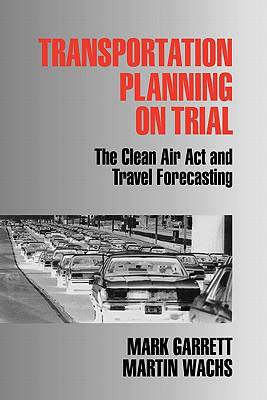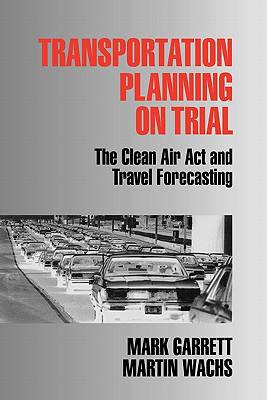
- Afhalen na 1 uur in een winkel met voorraad
- Gratis thuislevering in België vanaf € 30
- Ruim aanbod met 7 miljoen producten
- Afhalen na 1 uur in een winkel met voorraad
- Gratis thuislevering in België vanaf € 30
- Ruim aanbod met 7 miljoen producten
Zoeken
Transportation Planning on Trial
The Clean Air ACT and Travel Forecasting
Mark Garrett, Martin Wachs
€ 160,45
+ 320 punten
Uitvoering
Omschrijving
Authors′ ad copy***Use whenever possible*** The Clean Air Act of 1991 and the Intermodal Surface Transportation Efficiency Act of 1994 require that metropolitan transportation planning agencies give high priority to the improvement of air quality. Under these laws, transportation planners must design regional highway and transit systems that contribute substantially to the attainment of federal air quality standards. This new requirement reveals important limitations to the standard methods by which transportation planners do their work. The mathematical models and statistical techniques used by transportation planners appear to be inadequate to enable them to analyze the air quality implications of alternative transportation plans. This was the situation when a group of environmental organizations brought suit in federal district court alleging that the Metropolitan Transportation Commission in the San Francisco Bay area had violated requirements of these laws in its transportation planning and highway funding activities. This volume provides an account of the legal dispute that pitted environmentalists against regional transportation planners, and which demonstrated that regional transportation planning methods are in need of substantial improvement. This monograph should be of interest to urban planners, environmentalists, public policy analysts, and those who apply mathematical modeling and statistical analysis to questions of public policy. The authors--an attorney and a transportation planner who took part in the lawsuit--analyze the specific arguments made by both sides in this important legal action, and draw from the specific case broader conclusions about the role of technical analysis in public policy making. *************************************************************** Urban planning does not and cannot exist in isolation--there are a large number of external factors that impact on a planner′s work including politics and the planning commission; environmental impact studies; and national, state, and local legislation. Focusing on the interrelations between federal legislation, the judicial process, and transportation planning, Transportation Planning on Trial examines the interaction between regional transportation planning and environmental, particularly air, quality. This unique volume is designed to help urban planners understand the legal restrictions and requirements that directly impact how they operate. It considers two recent federal legislation pieces--the Clean Air Act of 1990 and the Intermodal Surface Transportation Efficiency Act of 1991--that mark the most important landmarks in a decade-long shift in emphasis in regional transportation planning. This groundbreaking volume will be vitally important to transportation planners, students of urban and transportation planning, transportation policymakers, environmentalists and environmental lawyers.
Specificaties
Betrokkenen
- Auteur(s):
- Uitgeverij:
Inhoud
- Aantal bladzijden:
- 240
- Taal:
- Engels
- Reeks:
Eigenschappen
- Productcode (EAN):
- 9780803973534
- Verschijningsdatum:
- 1/05/1996
- Uitvoering:
- Paperback
- Formaat:
- Trade paperback (VS)
- Afmetingen:
- 152 mm x 228 mm
- Gewicht:
- 362 g

Alleen bij Standaard Boekhandel
+ 320 punten op je klantenkaart van Standaard Boekhandel
Beoordelingen
We publiceren alleen reviews die voldoen aan de voorwaarden voor reviews. Bekijk onze voorwaarden voor reviews.











